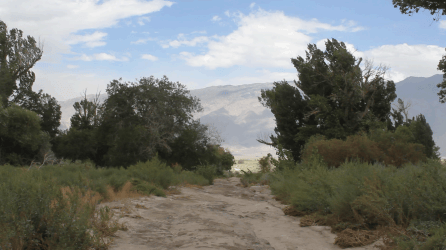On February 19, 1942, President Franklin D. Roosevelt signed Executive Order 9066, authorizing the forced removal and imprisonment of all Japanese Americans living on the West Coast. Maya Castronovo’s documentary short, Flood of Memory, explores the role of memory and community storytelling in connection to a changing landscape at Manzanar, site of one of ten concentration camps that incarcerated over 100,000 Japanese Americans during World War II. The film’s voiceover narration consists of stories, memories, and reflections culled from seven oral history interviews with formerly incarcerated individuals. Castronovo filmed and completed the documentary while serving as a Great Basin Institute Research Associate at the Manzanar National Historic Site.

Movie still and quote from Flood of Memory. (Castronovo 2024, 5:20 min. mark) All images below are movie stills, © Maya Castronovo, 2024.
Last August, the rain came down at Manzanar. Hurricane Hilary swept across Mexico and the Southwestern United States, bringing gusty winds and torrential rain to Inyo County, California, a place that typically receives only six inches of annual precipitation. I wasn’t there for the storm, but I witnessed what came afterward: flooded roads, mudflow, dust, and cracked earth. Layers of silt and sediment buried several of the site’s historic ponds and gardens, delaying community efforts to preserve Manzanar’s cultural and natural resources.

In the wake of such destruction, one feels the vanishing of human history, and the shifting contours of the land itself. As the unfolding climate crisis threatens to erode our ties to the past, how will we continue to remember?

My documentary film, Flood of Memory, explores this question through a variety of media. By weaving together oral history interviews, archived home movie footage, and present-day visuals, I attempt to situate histories of racial exclusion and displacement within broader frameworks of ecological disaster.
In the aftermath of Hurricane Hilary, a historic weather event where a tropical storm made landfall in the California desert, I began documenting environmental devastation at Manzanar through a series of static shots. For me, the act of filming was a way to process the impacts of climate change and interpret an increasingly unstable world. Within our current moment of environmental precarity, my film urges us to consider how folk sources and community storytelling not only connect us to the past, but may also help us reckon with an uncertain future.
Flood of Memory resists “official” accounts of history. Instead, the film highlights fragmented memories and gaps within the archive by raising the following questions:
- How can landscapes and the natural world contain histories of racial exclusion, removal, and displacement?
- In what ways can living culture and stories help us cope with the change and loss associated with environmental crises?
- Who gets to tell history? How can community storytelling and place-based knowledge shape our understanding of intergenerational trauma?
Maya Castronovo is a filmmaker and MFA candidate at Northwestern University’s Documentary Media program. She has a Film and Media Studies degree from Columbia University.
Works Cited
Castronovo, Maya, dir. 2024. Flood of Memory. Independence, California, 8:09 min, https://vimeo.com/943871311.
